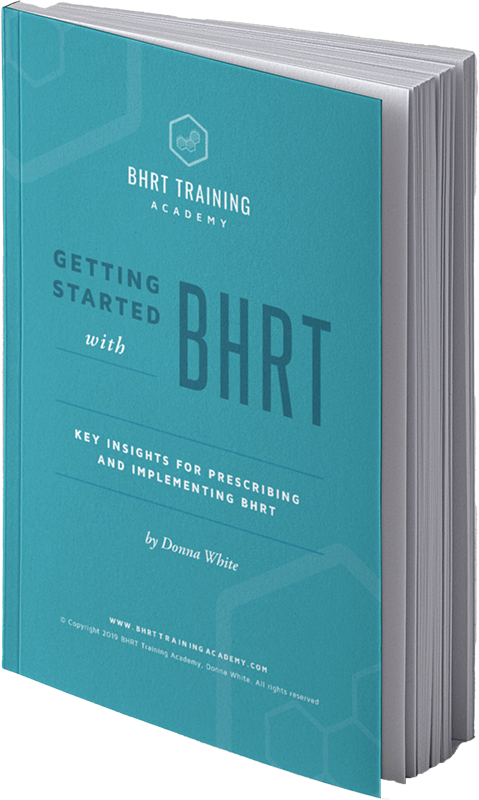Why Do So Many Women Struggle With Hormone Imbalance?

I’m sure that you see patients every single day in your practice that complain of hot flashes, night sweats, foggy thinking, low sex drive, weight gain, fatigue or mood problems such as depression, anxiety or irritability. In fact, 85 percent of women report experiencing symptoms during the menopausal transition.
Have you ever wondered why so many women struggle during this time of their life, especially since it’s perfectly normal to go through menopause? It is not just menopausal women that are symptomatic. Up to 80% of younger women report having some symptoms prior to their menstrual cycle. This should not be the norm, but unfortunately that is often the case.
In this article let’s first review the common causes of hormone imbalance and then discuss the potential benefit of bioidentical hormones along with hormone balancing protocols for these patients.
Common Causes of Hormonal Imbalances
- Age – Normal age-related decline in hormone levels is the most common cause of hormone imbalances and deficiencies. Levels of estrogen, progesterone, and testosterone all decline as we grow older.
- Stress – Stress is also a major culprit in hormone problems. It affects the adrenal glands in such a way that the levels of stress hormones, in this case DHEA and cortisol, can become abnormal. Changes in DHEA and cortisol affect the other hormones. Stressors include: emotional, physical such as chronic pain or inflammation, blood sugar imbalance, chronic infections, food sensitivities, etc.
- Weight Gain – Weight gain affects hormone levels and hormone levels affect metabolism which can result in weight gain. This can be a vicious cycle.
- Diet – Hormone imbalances can result from poor diet and nutritional deficiencies. Key nutrients are required to synthesize and metabolize hormones.
- Failure to Ovulate – Women begin to skip ovulation frequently as they move into their late thirties and early forties (or due to excessive stress) which affects hormone levels, in particular, progesterone production.
- Ovarian Dysfunction – Hormone imbalances can also result when the ovaries simply produce too much or too little estrogen, progesterone, or testosterone for various reasons.
- Other Glandular Dysfunctions – Dysfunctions of other glands, such as the thyroid and adrenals, can cause sex hormone imbalances.
- Non-Bioidentical Hormones – Synthetic or animal-derived hormones, like those in oral contraceptives and traditional HRT, can trigger hormone imbalance and related symptoms.
- Xenoestrogens – Xenoestrogens and other endocrine disruptors are synthetic chemicals with molecular structures similar to those of estrogens. Produced by industrial, agricultural, and chemical companies from a variety of sources, they are found in air, water, and food. Many researchers believe these substances are causing hormonal imbalances.
- Others – Other factors such as a genetic propensity, food allergies or intolerances, gut dysbiosis, mitochondrial dysfunction or inflammation can all lead to hormone imbalance.
Hormone Balance is Important
Maintaining balanced hormones is required for optimal health and disease prevention. If these symptoms persist and are not dealt with there can be more serious ramifications such as hormone related cancers, bone loss, heart disease, or cognitive decline.
Hormone Balance Solutions
Despite the fact that hormone imbalance is rampant and there are numerous potential causes, there are solutions. Moreover, there are solutions beyond just masking symptoms with antidepressants or antianxiety medications, non-bioidentical hormones, sleeping pills etc.
As a BHRT provider or a provider that is interested in learning more about correcting hormone imbalance there are numerous tools and protocols at your disposal to help these women.
The first step typically involves assessment of symptoms, health history, exam, and lab testing. Armed with this information, customized treatment plans can be developed, typically consisting of bioidentical hormones and/or hormone balancing supplements, along with dietary and lifestyle protocols.
The results?
It is not uncommon at all to have patients come back after starting BHRT and say things like, “You have changed my life”, I feel like myself again or “My husband thanks you!” The following comments are from patients that reveal common sentiments.
“Hi to everyone who is 35 years or older that is experiencing even the slightest menstrual related symptoms or symptoms such as heavier periods, tender or cystic breasts, difficulty going or staying asleep, weight gain especially around the midsection, mood swings, etc. Don’t wait until they become unbearable or believe that your only options are birth control pills, antidepressants, sleep medications and/or a hysterectomy. None of these options get to the root cause of the actual problem. The actual problem is the natural aging process of declining hormones. (BUMMER, but true) I personally started on BHRT at 40 and sailed through perimenopause and menopause with only with a few night sweats to which I was recommended to add more estrogen. I am confident that the long-term benefits will include a reduced risk of all cancers and heart disease as well as a reduced risk of declining brain function and declining quality of life. I am fortunate that I was able to start on them at a young age and that I have been able to avoid any other prescription medications. Do I pay out of pocket? Do I take multiple prescriptions of BHRT in every form available? Do I see my prescribing doctor regularly and get labs done? ABSOLUTELY as it is worth every penny to me. These are not sacrifices to me, they are musts to maintain the level and quality of life that I want for a long time to come.”
Jeny K
“At my primary care doctor’s office, I was introduced to Donna White, a BHRT Clinical Education Consultant. Donna provided education on how to properly test and treat hormones and their related imbalances. I was immediately switched to bioidentical hormones by my doctor. Within the first week, I became noticeably less depressed, and I had a marked decrease in anxiety and tremendous improvement in food cravings. And over the next year, I lost eighteen pounds without even changing my diet. People are always asking me what I have done to my face, too, because they say my skin looks so much better, and I look younger. Before BHRT, I was on antidepressants, sleep, pain, and anxiety medication. Now I don’t have to take any of those. My life has totally changed thanks to BHRT. I would like to encourage women to help themselves with this type of testing and treatment.”
Janice G.
Still yet, why are so many women are still suffering when there are solutions? I would like to change that.

Get the quick read ebook,
Getting Started with BHRT -
Key Insights to Prescribing and Implementing BHRT.
CME's - Earn while you learn.
